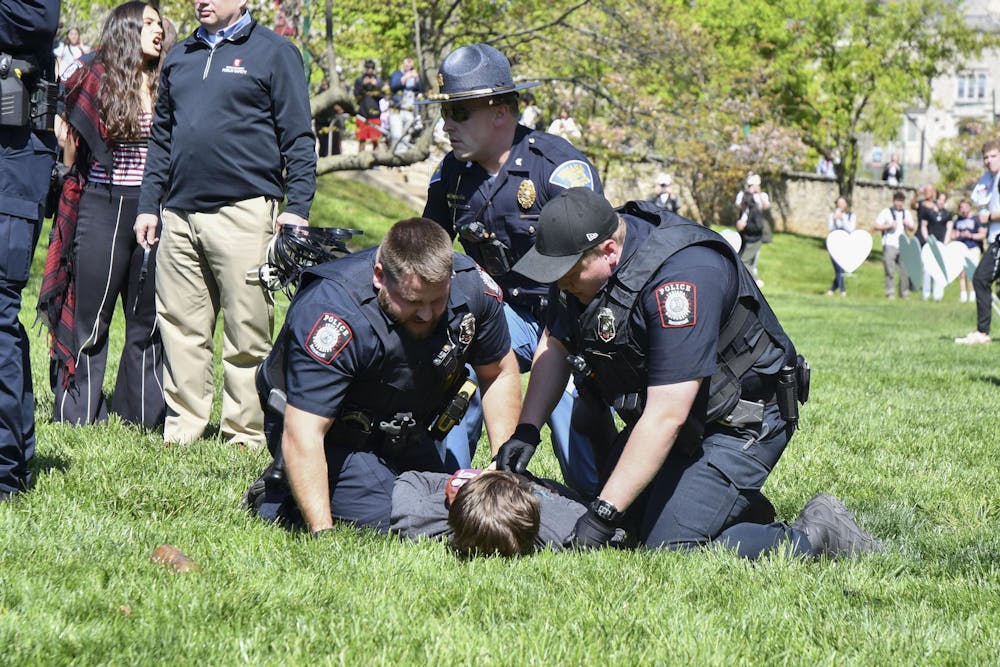Since 1969, an IU Bloomington policy has allowed the use of temporary structures in Dunn Meadow without prior approval, forbidding them from 11 p.m. to 6 a.m. IU changed the policy to ban the use of structures without prior approval April 24 — a day before the IU Divestment Coalition set up encampments in Dunn Meadow on Thursday.
The new policy, which can be viewed under the “Outdoor Spaces” dropdown menu on the Office of Student Life website, forbids the use of permanent or temporary structures without approval by the Office of the Vice Provost for Student Life and University Events. The policy change cited a section of the 1969 policy that suggested the creation of a committee by the Bloomington provost to give “continuing advice on changes of policy” and review denials of permission for “uncarried overnight signs, symbols or structures.” It suggests a small committee for prompt action if review is ever needed.
The new policy claimed the change was approved by “the Ad Hoc Committee,” but the IDS talked to several faculty members who were not aware of such a committee. Steve Sanders, a Maurer School of Law professor, said he is certain no such committee exists today.
“To invoke a reference to an ad hoc committee that might have existed half a century ago and attempt to use it to justify the on-the-fly creation of a new policy today, is utterly unprincipled,” Sanders said in an email. “If a university lawyer was involved in concocting this rationalization, then no one should trust their integrity or judgment.”
In an email to faculty, Whitten confirmed the university changed the policy Wednesday night after becoming aware of the Thursday protest to “balance free speech and safety in the context of similar protests occurring nationally.” She wrote that the policy was posted online the morning of the protest.
“Our university must create a space for meaningful dialogue, while ensuring that our campus is safe and welcoming to all, and that peaceful protest, as many experienced today, symbolizes our steadfastness to the free expression of ideas,” Whitten wrote.
IU executive director of media relations Mark Bode did not respond to a question regarding the members of the “Ad Hoc Committee.”
“Indiana University Bloomington is a campus where we encourage and respect free speech and open dialogue,” Bode wrote in an emailed statement. “To ensure the safety and security of the IU community and to avoid disruption of university operations, expressive activity must be conducted in accordance with university free speech and events policies. This includes the enforcement of policies that require advanced approval for the installation of temporary structures.”
Related: 33 pro-Palestinian protesters arrested at Dunn Meadow encampment Thursday
The protest saw a physical confrontation as police forcefully arrested peaceful protesters.
An ad hoc committee is a temporary committee designed for a specific purpose. This makes it harder to argue the policy change works with the First Amendment, Sanders, who teaches constitutional law, said in an interview with the IDS.
“When you change a policy like that literally on the eve of an event you’re expecting, you can no longer say that’s a neutral policy,” he said.
The timing of the change allows people to reasonably infer the change was targeted to disadvantage a particular viewpoint, he said.
Generally, restrictions on free speech must be viewpoint neutral under the First Amendment.
According to an emailed statement from IUPD, police detained 33 protesters and took them to the Monroe County Jail. The IDS observed that at least one was an IU faculty member — Germanic Studies professor Benjamin Robinson. At least one student protester — Christopher Handwerger — was arrested for criminal trespass and received a trespass warning from IUPD banning him from IU property for a year. Handwerger told the IDS he is a first-semester senior, meaning he needs this coming fall semester to graduate.
Bode sent a statement to the IDS in response to an inquiry about arrested students and faculty who were temporarily banned from campus.
“We encourage affected faculty and students to engage in the appeals process by contacting IUPD,” the statement read. “Trespass ban notices will be suspended during the appeals process in nearly all cases. This will allow these students and faculty to complete the semester.”
Handwerger said he was proud for standing for what was right and called the ban and his arrest a “farce.”
“I kind of feel like this is total bullshit,” he said.
Though Handwerger was released, he has a court date this summer.
A history of tents in Dunn Meadow
Bill Breeden, a former Unitarian Universalist minister, said at the protest that he had participated in a 45-day protest of the Gulf War in 1991 at Dunn Meadow. They camped overnight, and he said they were not violating policy if they cleaned up and someone remained awake during the night. He only recalled police interaction when protests occurred in university buildings.
Marc Haggerty, who came to IU at 19 after serving in the Vietnam War, said he led protests against the Vietnam War on IU’s campus. Haggerty said protests exploded following the 1969 draft lottery but said he hadn’t seen police intervention like today’s protest.
He described one moment where protesters had marched to Third Street and Indiana Avenue, drawing police from the state, county, city and campus. As police were about to charge the group, Haggerty got word that the IU administration agreed to meet with them, he said. Haggerty announced the news to the group, telling them that since the administration was acting in good faith, they should leave for Dunn Meadow, he recalled, ultimately preventing a clash with police.
This story was updated to include a statement from Mark Bode in response to an inquiry about arrested students and faculty who were temporarily banned from campus.




